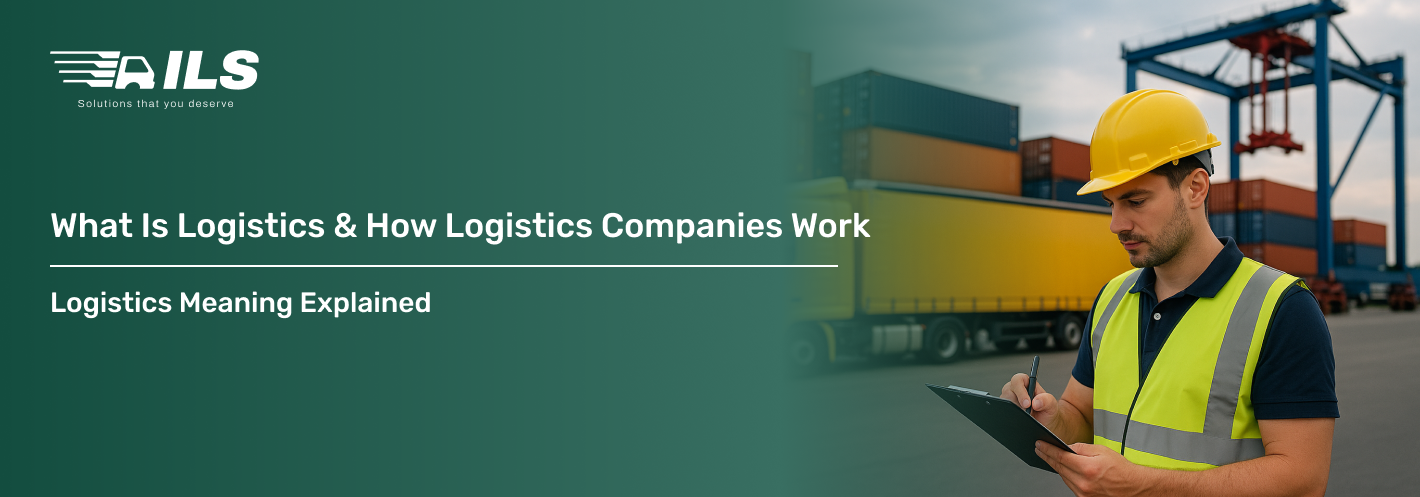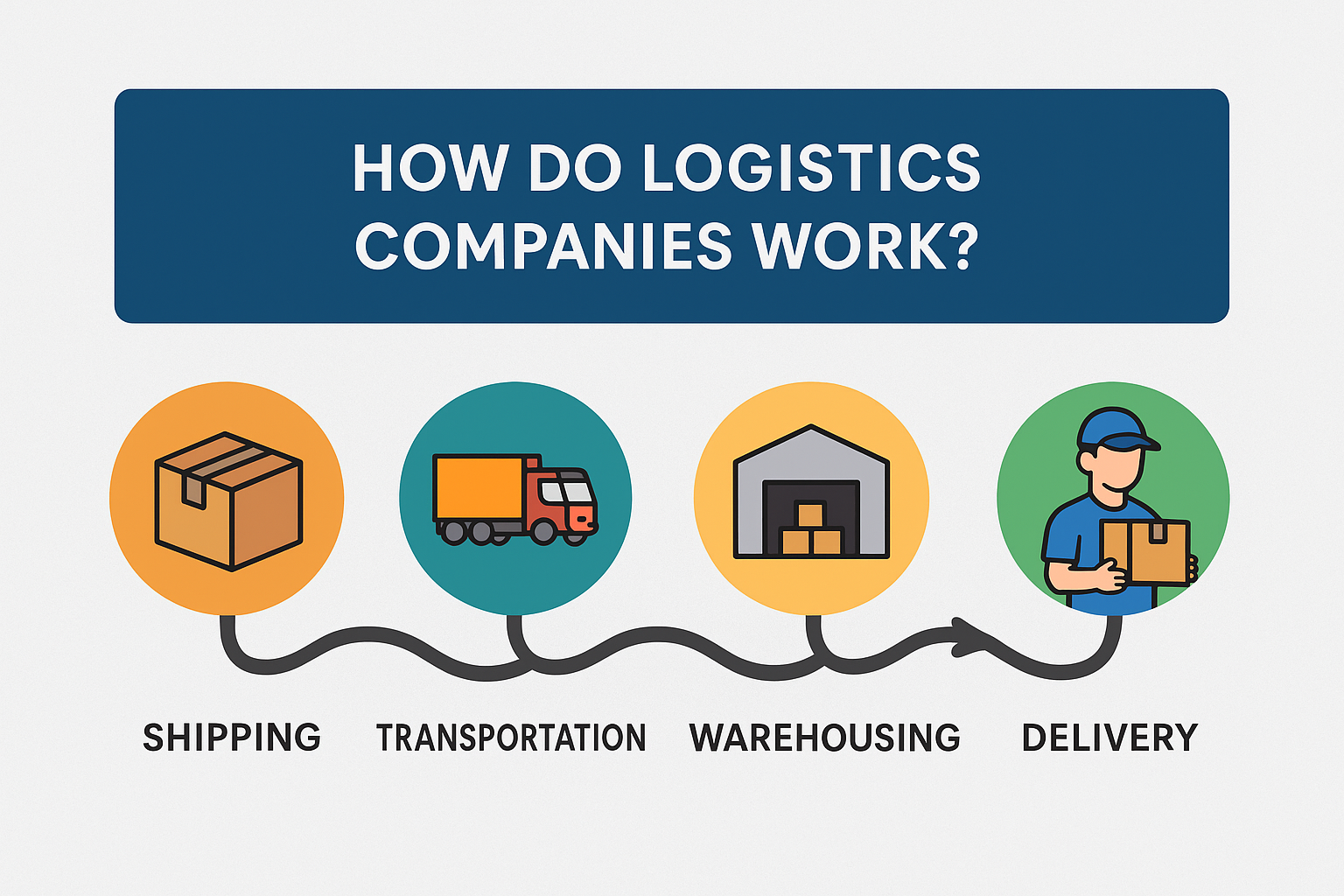Logistics Meaning Explained: What Is Logistics & How Logistics Companies Work
Logistics Tech & Automation
In today’s fast-paced world, logistics plays a crucial role in our daily lives, from getting packages delivered on time to ensuring shelves are stocked with products. Whether it’s a small online business or a large multinational company, logistics forms the backbone of operations.
But what is the meaning of logistics, and why is it so important to understand? In this blog, we’ll explore the logistics meaning, how logistics companies work, and the types of logistics services that keep businesses running smoothly.
Also Read: https://ilsportal.io/blogs/logistics-management
What is the Meaning of Logistics?
So, what is meant by logistics? Put, logistics is the process of planning, implementing, and controlling the efficient flow and storage of goods, services, and information from the point of origin to the point of consumption.
The word "logistics" originates from the Greek word logistics, which refers to being skilled in calculating. It was widely used in the military to describe the movement and supply of troops. Today, the term has expanded to include all kinds of business operations.
Key components of logistics include:
- Transportation – moving goods via road, rail, sea, or air
- Warehousing – storing goods until needed
- Inventory Management – tracking stock levels and demand
- Delivery – ensuring timely arrival at the right destination
A common question is: What is the difference between logistics and supply chain management? While logistics focuses on the movement and storage of goods, supply chain management is a broader term that includes logistics along with sourcing, procurement, and production planning.
Logistics Meaning in Different Languages
Understanding the logistics meaning in various regional languages can help bridge knowledge gaps, especially in a multilingual country like India. Here's a table showing how the word “logistics” is interpreted across different languages:
| Language | Translation / Meaning of Logistics |
|---|---|
| Logistics Meaning in English | Logistics |
| Logistics Meaning in Hindi | रसद (Rasad) / लॉजिस्टिक्स |
| Logistics Meaning in Malayalam | ലൊജിസ്റ്റിക്സ് (Lojisttiks) |
| Logistics Meaning in Telugu | లాజిస్టిక్స్ (Lājisṭiks) |
| Logistics Meaning in Marathi | लॉजिस्टिक्स |
| Logistics Meaning in Bengali | লজিস্টিকস (Lôjistikôs) |
| Logistics Meaning in Kannada | ಲಾಜಿಸ್ಟಿಕ್ಸ್ (Lājisṭiks) |
| Logistics Meaning in Tamil | லாஜிஸ்டிக்ஸ் (Lājistikks) |
| Logistics Meaning in Gujarati | લોજિસ્ટિક્સ |
| Logistics Meaning in Urdu | رسد / لاجسٹکس |
Types of Logistics
Understanding the different types of logistics helps explain how goods move within various business operations:
1. Inbound Logistics
Deals with sourcing, purchasing, and transporting raw materials or goods into a company.
2. Outbound Logistics
Focuses on delivering finished products from the business to the customer.
3. Third-Party Logistics (3PL)
Outsourcing logistics activities (like warehousing and shipping) to specialized providers.
4. Reverse Logistics
Handles the return of goods due to defects or recycling purposes.
Each of these plays a vital role in ensuring the right products reach the right place at the right time.
What Are Logistics Services?
Logistics services encompass a wide range of solutions that help businesses manage the movement, storage, and distribution of products.
Common logistics services include:
- Freight forwarding
- Customs clearance
- Order fulfillment
- Last-mile delivery
- Shipping and packaging solutions
In sectors like e-commerce, retail, FMCG, and manufacturing, logistics services are essential to meet customer expectations and maintain supply efficiency.
If you’re wondering what logistics services are in practical terms, it’s everything that happens after an order is placed until it reaches the customer's doorstep.
Logistics Company Meaning
A logistics company is an organization that offers logistics services to other businesses or individuals. These companies manage the flow of goods from origin to destination, making sure everything runs smoothly.
The logistics company's meaning can be summed up as a service provider that handles the physical movement of products, supported by technology and infrastructure.
Responsibilities of a logistics company include:
- Receiving and processing orders
- Managing inventory
- Providing storage solutions
- Planning transportation routes
- Ensuring timely and safe delivery
Well-known logistics companies around the world include DHL, FedEx, UPS, Blue Dart, and DTDC. They specialize in handling complex shipping and logistics networks both domestically and internationally.
How Do Logistics Companies Work?

Let’s take a look at how a logistics company typically operates, step by step:
- Order Receiving: The process starts with receiving shipment details from the client or customer.
- Packaging & Inventory Management: Items are packed, labelled, and organized for shipment. Inventory is tracked in real time.
- Route Planning and Transportation: Efficient delivery routes are planned based on cost, distance, and delivery speed.
- Shipment and Tracking: Goods are shipped using different modes (air, road, sea), and real-time tracking is provided.
- Final Delivery: The product is delivered to the end customer, often with proof of delivery (POD).
Advanced logistics companies use software solutions, AI-based tracking tools, and IoT sensors to enhance their operations and deliver higher accuracy.
Whether you're managing shipment meaning in logistics or understanding the role of a logistics administrator, it's clear that logistics companies are highly organized systems built on speed and reliability.
Importance of Logistics in Business
Efficient logistics can make or break a business. Here’s why:
- Cost Efficiency – Reduces waste and saves on operational expenses
- Customer Satisfaction – Ensures on-time delivery and better service
- Brand Trust – Builds credibility and encourages repeat purchases
- Competitive Edge – Fast, reliable shipping can differentiate a brand
Take Amazon, for example. Its success is largely built on a robust logistics network that ensures fast, reliable deliveries to customers around the world.
Challenges Faced in Logistics
Despite advancements, logistics companies still face many challenges:
- Delivery Delays due to weather, traffic, or customs issues
- Weight Disputes between declared vs. actual shipment weight
- Last-mile delivery problems, especially in remote areas
- Inventory Mismatches causing stockouts or overstocking
To solve these, companies are adopting AI for predictive analysis, using drones for deliveries, and deploying logistics administrators to streamline operations.
Multi-Courier Logistics Management from a Single Dashboard
ILS Portal simplifies your logistics by offering a unified platform that integrates with top courier services like Blue Dart, Delhivery, XpressBees, and more. This multi-courier access helps you choose the best shipping option based on speed, cost, and serviceability, speeding up your eCommerce delivery process without switching between different courier dashboards.
Also Read Our Latest Blog: Delhivery vs Blue Dart vs DTDC Comparison
Conclusion
To sum it up, logistics is more than just transportation. It’s a critical part of any business that deals with physical goods. Understanding the logistics meaning, the logistics company meaning, and the various logistics services meaning can help individuals and businesses alike make informed decisions.
Whether you’re a budding entrepreneur, a student, or someone working in the industry, knowing what is the meaning of logistics and how it works is essential in today’s interconnected world.

